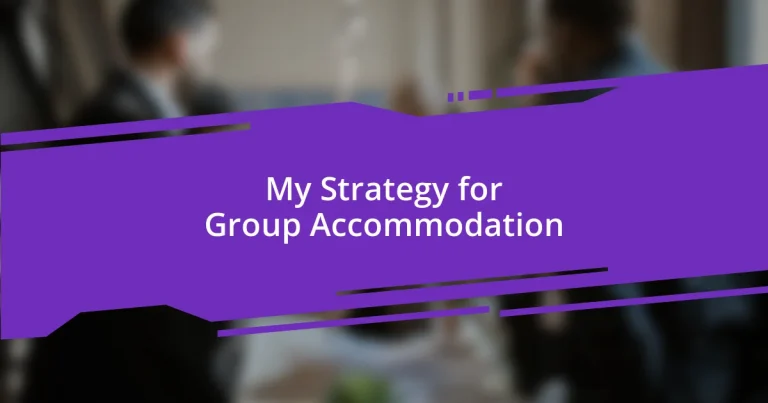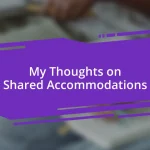Key takeaways:
- Group accommodation fosters deeper bonding and creates memorable shared experiences, often enhancing relationships compared to separate hotel stays.
- Identifying the group’s needs, including size, amenities, and budget, ensures a comfortable and enjoyable stay for all members.
- Effective communication with accommodation providers and continuous feedback post-trip enhance the overall experience and help with future planning.
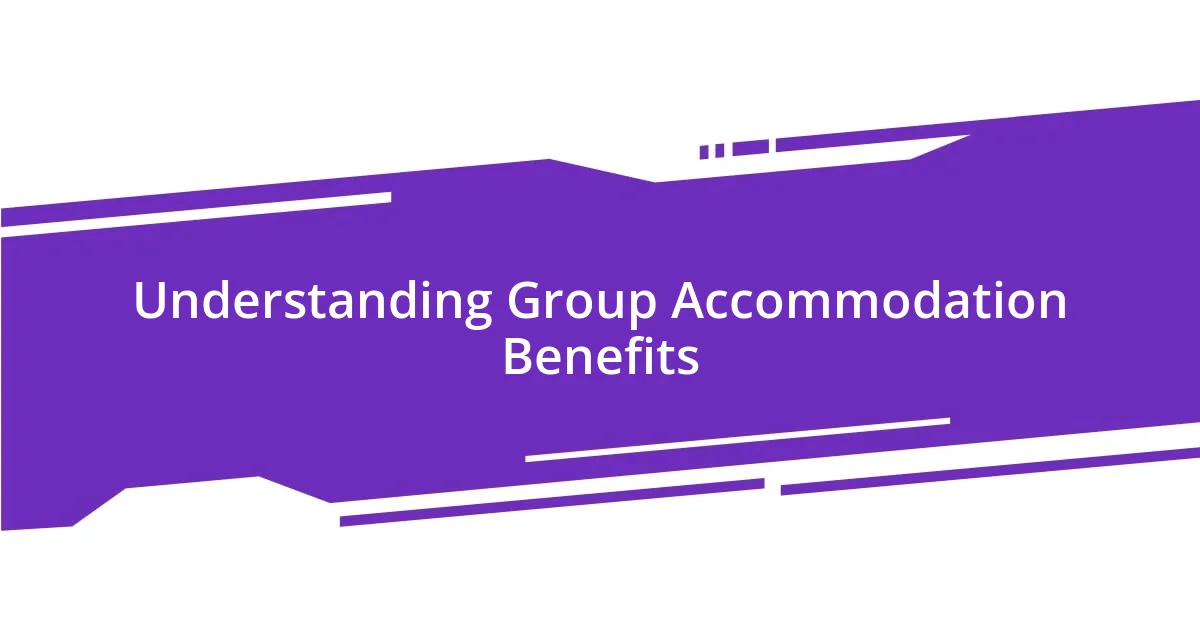
Understanding Group Accommodation Benefits
When I think about group accommodation, one of the first benefits that comes to mind is the chance for deeper bonding. I remember a family reunion where we all stayed under one roof. It was incredible how sharing meals and stories in the same space allowed us to reconnect and strengthen our ties in a way that hotel rooms never could. Isn’t it amazing how simply being together can rekindle those relationships?
Cost efficiency is another significant advantage. Booking accommodation for a group often means securing lower rates per person compared to individual bookings. I once organized a weekend getaway with friends, and by renting a large house instead of booking separate hotel rooms, we not only saved money but also created an inviting atmosphere full of laughter and shared experiences. Doesn’t it feel good knowing you can enjoy a getaway without breaking the bank?
Lastly, the convenience of group accommodations can’t be overlooked. Having everyone in one location simplifies planning and coordination and eliminates those frustrating “where will we meet” conversations. I recall a workshop retreat where the shared space made it so much easier to collaborate and exchange ideas, contributing to a productive and inspiring experience. Who doesn’t appreciate the ease of being able to gather everyone in a single, comfortable setting?

Identifying Your Group’s Needs
Identifying the needs of your group is the first step in ensuring a successful accommodation experience. I often find that having a clear understanding of what everyone wants can drastically reduce the stress of planning. For instance, during a recent friends’ retreat, we created a simple list of our preferences—like the number of bedrooms needed, preferred amenities, and even dietary restrictions—which allowed us to select the perfect house together. It’s fascinating how such clarity can streamline your choices.
Moreover, I suggest considering the group’s dynamics. Are you traveling with families, colleagues, or friends? This can shape what accommodations will work best. I remember planning a multi-family vacation where we prioritized child-friendly spaces, which turned out to be vital. By focusing on one another’s needs, we ensured that everyone felt comfortable, leading to shared laughter and unforgettable memories. What would your group feel most at ease with?
Finally, don’t shy away from asking your group for input. Gathering opinions guarantees that the accommodation resonates with everyone’s expectations. I recall my last group trip when we devised a quick poll using a messaging app, allowing everyone to suggest potential places. This inclusion made everyone feel valued and increased excitement around our destination. Have you ever noticed how collective decision-making can enhance the overall experience?
| Need | Description |
|---|---|
| Accommodation Size | Determine the number of bedrooms and bathrooms required to comfortably house everyone. |
| Amenities | List necessary features, like a kitchen, pool, or outdoor space, to support your group’s activities. |
| Location | Consider proximity to points of interest or activities your group plans to explore. |
| Budget | Establish a clear budget per person to make choices that fit within financial limits. |
| Group Dynamics | Identify the types of relationships present to create an environment everyone enjoys. |
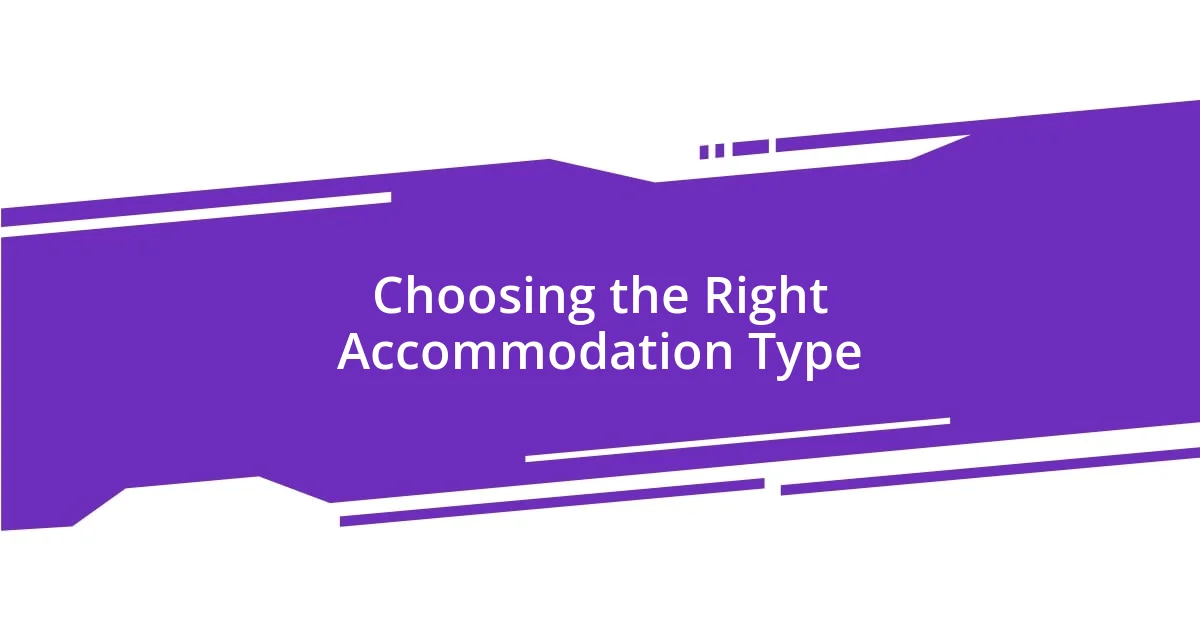
Choosing the Right Accommodation Type
Choosing the right accommodation type can feel overwhelming, but it doesn’t have to be. In my experience, narrowing down options often involves a mix of practical considerations and personal preferences. For example, during last summer’s trip with friends, we had various accommodation types to consider, from cozy cabins to spacious villas. We ended up choosing a villa, which offered communal spaces for gathering but also gave us private bedrooms to retreat to when needed. Balancing common areas with personal space can make a significant difference in how everyone feels during the stay.
Here’s a quick checklist to help guide your choice:
- Size: Ensure the accommodation can comfortably house your group size, factoring in common areas for togetherness.
- Style: Decide if you want a homey feel, like a vacation rental, or a more structured environment, such as a hostel or hotel.
- Amenities: Consider what features are necessary—kitchens for meal prep, outdoor spaces for relaxation, or entertainment options for downtime.
- Accessibility: Look into any specific mobility needs among your group, ensuring that your accommodation can accommodate those disabilities.
- Atmosphere: Think about the mood you want to create. A cabin in the woods might inspire adventure, while a beach house could foster relaxation and fun.
By reflecting on these factors, you can make a choice that not only meets your practical needs but also enriches the overall experience for everyone involved.
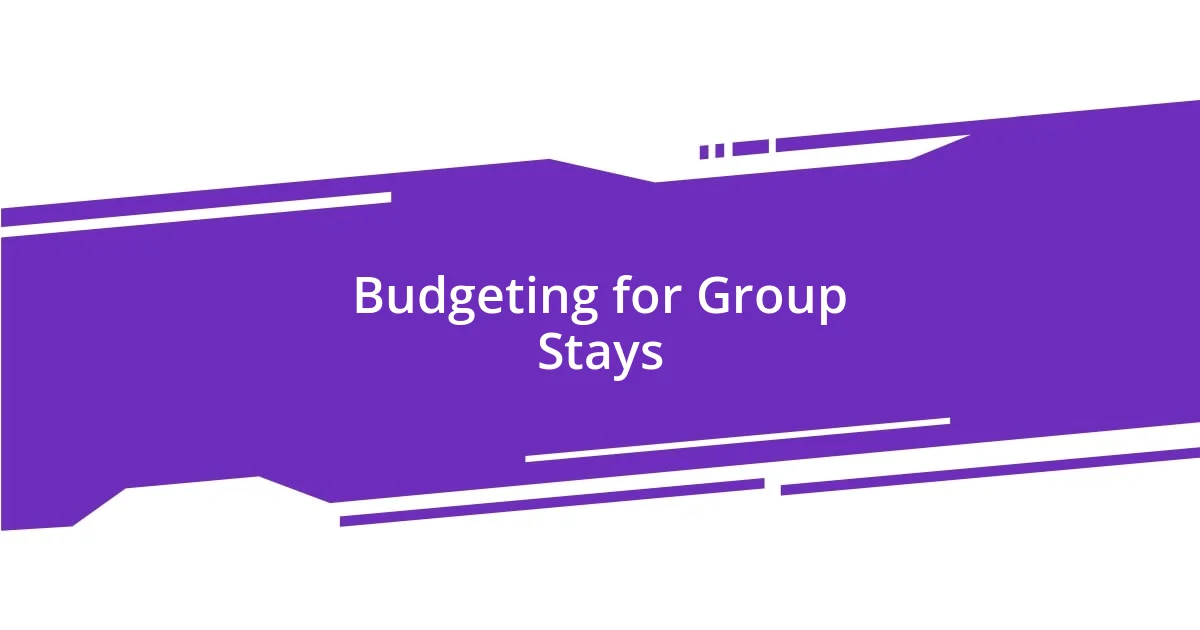
Budgeting for Group Stays
When it comes to budgeting for group stays, the first step is to set clear financial boundaries. I remember a trip with my coworkers where we initially overlooked this aspect, thinking we could handle it as we went along. Instead, we ended up scrambling to keep up with each other’s spending preferences. Setting a budget that everyone agrees on not only helps in narrowing down accommodation options but also eases any potential financial stress during the trip. Have you ever faced similar budgeting challenges with friends or family?
Including everyone in the financial conversation can make a huge difference. On one memorable family getaway, we each contributed to an overall budget and decided together how much we could allocate for accommodation versus activities. This shared ownership made us all feel more comfortable with our choices and created a sense of teamwork. There’s something reassuring about collaborating on financial decisions—it’s akin to building a solid foundation for the group experience. How would you approach a collective budget with your group?
Lastly, don’t forget to factor in hidden costs that may arise during your stay. There was one adventure where we didn’t consider the extra fees for amenities like parking or cleaning services. Those unexpected costs caught us off guard! Being proactive about understanding all expenses can prevent the discomfort of overspending. I advise my friends to always carefully review the total cost before booking, ensuring everyone is on the same page. What strategies do you use to keep surprise costs in check during group trips?
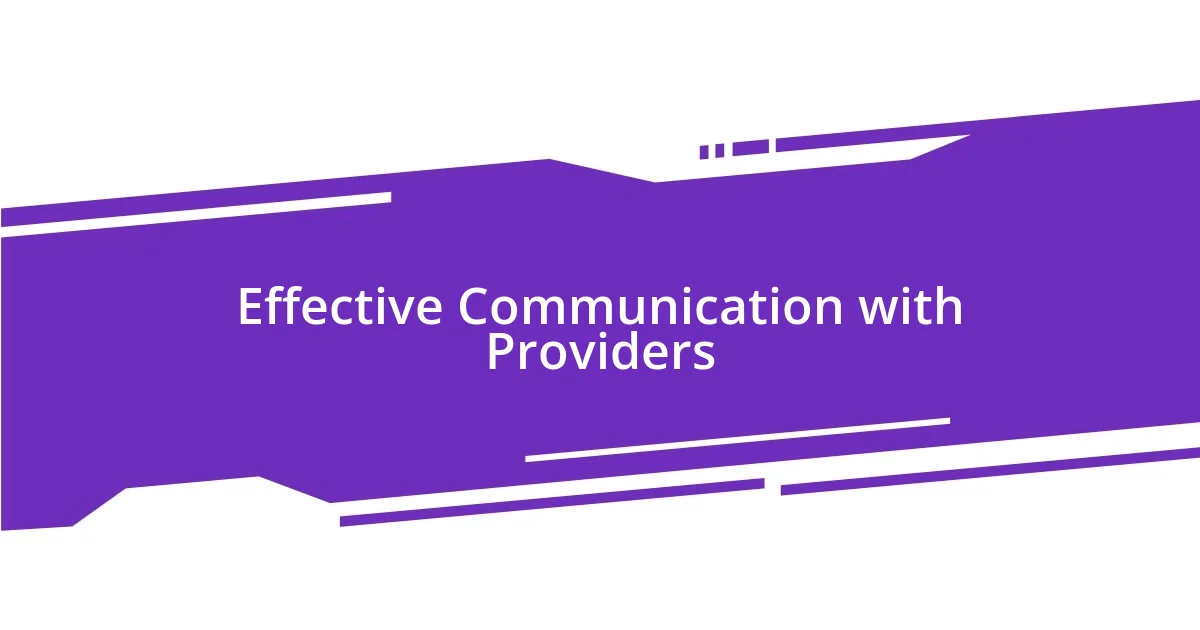
Effective Communication with Providers
Effective communication with accommodation providers is crucial for a smooth group stay. I recall reaching out to a host during a trip with my family and asking about specific amenities the property offered, like a large dining table that suited our group of ten. The clarity in my inquiry led the provider to highlight features I hadn’t considered, like a grill for outdoor meals. Have you ever discovered hidden gems just by asking the right questions?
Additionally, being transparent about your group’s needs can forge better relationships with providers. For instance, when we planned a reunion with college friends, I made it a point to discuss our preferences, ranging from late check-ins to dietary restrictions for meals. This openness not only resonated with the provider but also resulted in them offering us customized solutions that enhanced our experience. Have you ever noticed how a little honesty can transform a basic service into something exceptional?
Lastly, timely follow-ups can be equally important. I remember after booking a charming cabin, I casually checked in a week before our arrival. To my surprise, the host informed me about last-minute local events that would coincide with our stay—something we would have missed otherwise. Staying engaged before your trip can enrich your options and make your experience even more memorable. What proactive steps do you take to stay in touch with your providers?
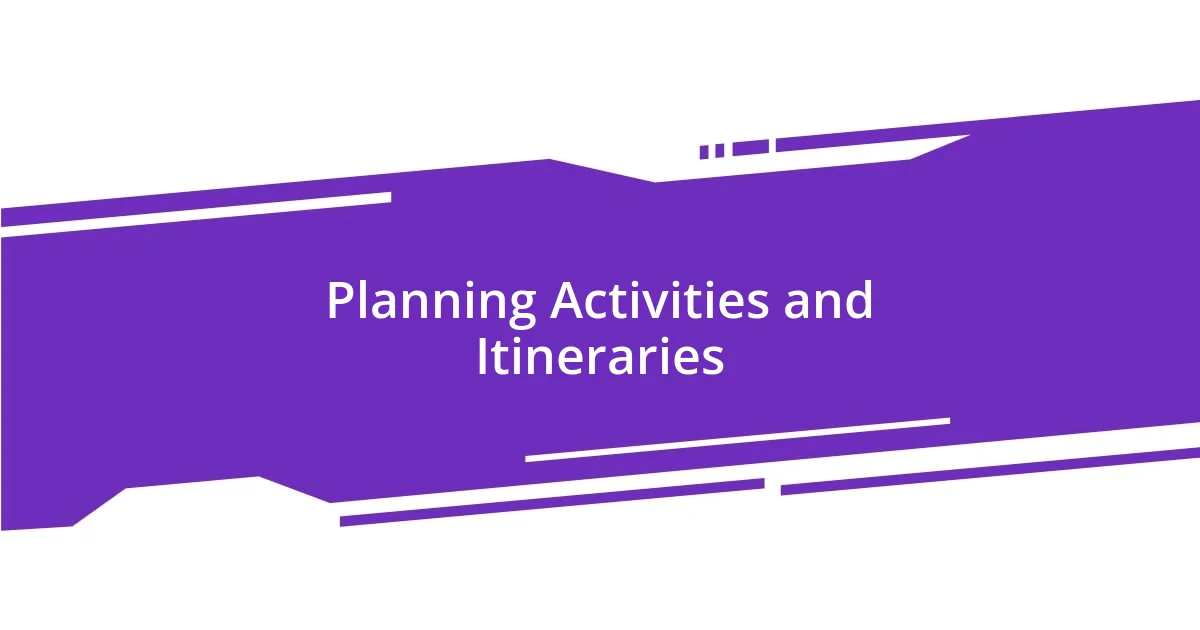
Planning Activities and Itineraries
Planning activities and itineraries for a group can feel overwhelming, but I’ve learned that breaking it down makes a world of difference. When organizing a weekend escape with friends, I like to create a shared document where everyone can contribute ideas. This way, everyone’s interests are considered, and it builds excitement as we start to shape our adventure. Have you ever tried collaborative planning? It can really transform how the group engages with the trip!
Once everyone shares their favorite activities, I prioritize them based on practicality and group consensus. During one trip to the mountains, we had a mix of thrill-seekers and those who preferred more leisurely pursuits. By balancing our itinerary with adrenaline-fueled hikes and serene evenings by the campfire, we managed to cater to everyone’s desires. How do you strike that balance when planning for diverse interests in your group?
Timing is also key when planning activities. I’ve found that allowing for flexibility while also having a loose schedule keeps the group in sync without feeling rushed. On one occasion, we planned out several excursions but ended up ditching one to enjoy an impromptu beach day. That spontaneity brought us closer together and created some of my favorite memories. How do you juggle the structure and spontaneity in your group travel plans?

Evaluating Your Group Experience
Evaluating your group experience starts with reflecting on how well the accommodations met your collective needs. I remember after a recent trip, we sat down and talked about what worked and what didn’t. Was the place spacious enough for us to relax together? Did it really provide the amenities we thought it would? These discussions not only highlighted our satisfaction but also pinpointed areas for improvement. Have you ever dissected your stay like this?
I often find that gathering feedback from each group member unveils different perspectives. During our last family reunion, my sister appreciated the cozy outdoor seating while my brother wished for more kitchen supplies for group cooking. What struck me was how much richer our experience became just by considering everyone’s input. Have you taken the time to capture everyone’s viewpoints after a group outing? It’s a simple step, yet it brings immense value.
Finally, analyzing not just the logistics but also the emotional impact of the trip is key. I recall feeling a deep connection with my friends during a game night in our rented house, something I hadn’t anticipated. That warmth and laughter are what truly made our stay special. I’ve learned that weighing both practical and emotional elements helps in planning even better for the next adventure. What moments made you feel the magic of your group experience?












